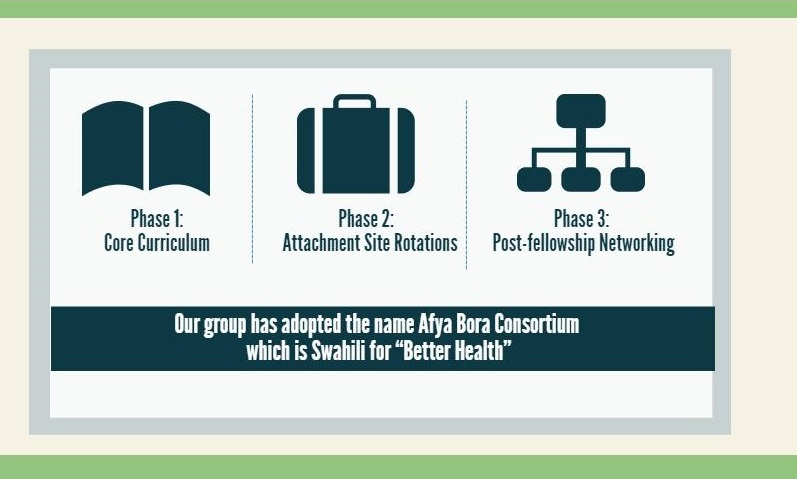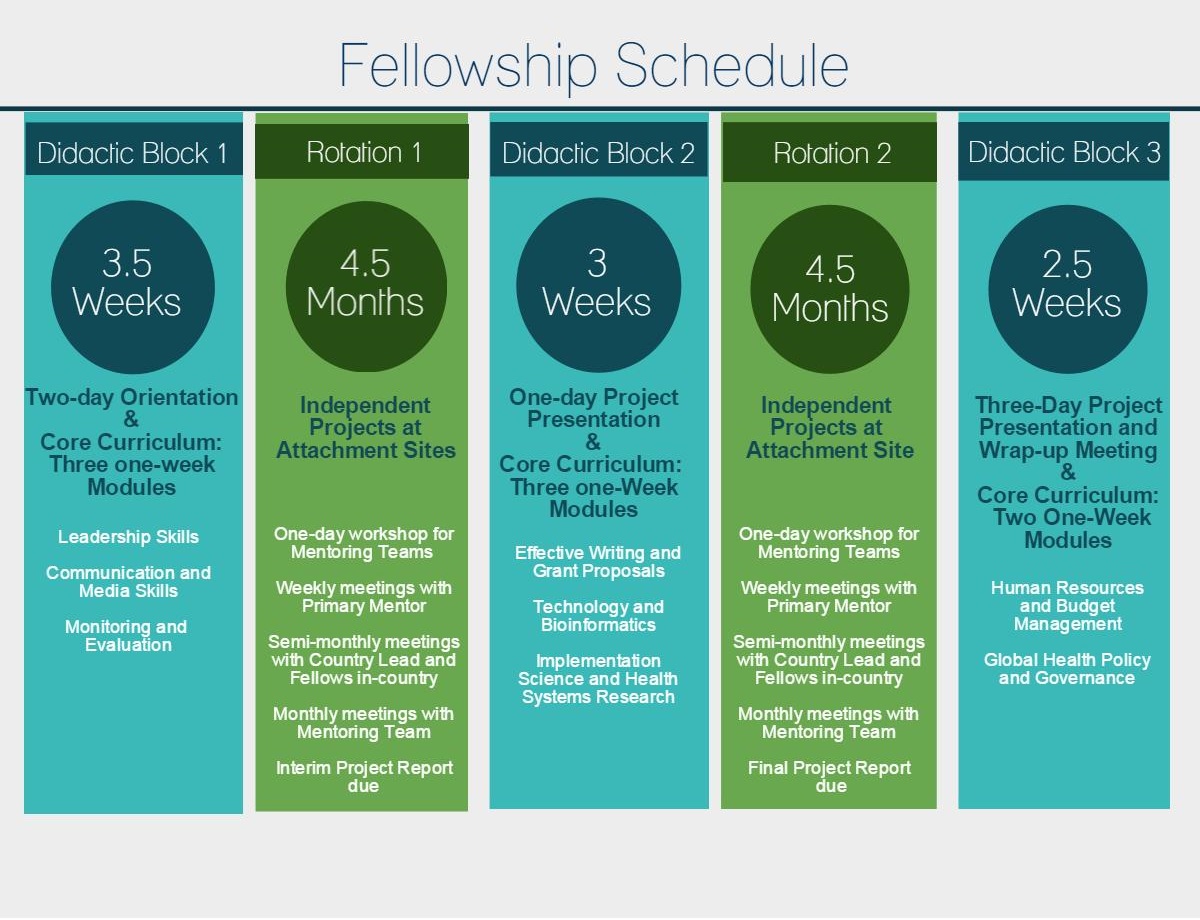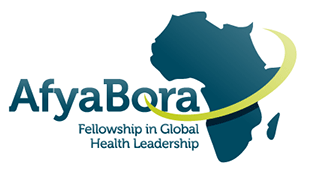
Core Curriculum: The Core Curriculum is taught at the African partner institutions and brings together each new cohort of African and U.S. trainees. The Core Curriculum consists of eight one-week didactic modules and two workshops: Leadership, Communication, Monitoring & Evaluation, Implementation Science, Effective Grant Writing, Human Resources & Budget Management, Health Informatics, Global Health Policy & Governance and two 1-2-day workshops on Qualitative Methods and Excel. In addition, Fellows complete four additional modules via distance learning during their time at their Attachment Sites. These distance learning modules are Program Management, Responsible Conduct of Research, Research Methods, and HIV/AIDS as a Global Health Challenge.
Attachment Site Rotations: Attachment Sites are organizations that serve as the basis for experiential learning internships for Fellows in our African partner countries. Working very closely with Consortium, these organizations include both governmental (Ministries of Health) and non-governmental organizations (NGOs), and other international health organizations such as CDC, USAID, WHO and academic institutions.
Two four-and-a-half-month Attachment Site rotations take place after the first and second Didactic Module Blocks. During these rotations, Fellows conduct independent projects at the same organization or (in some instances) at two different organizations. The Consortium uses a matching system to pair Fellows to sites that best reflect their interests and skills. Potential areas of focus include clinical research, public health and disease prevention, health policy formulation, health systems research, ; implementation science,; and program management and evaluation.
Post-fellowship networking: Alumni of the program are encouraged to network with other alumni and members of the Working Group to provide assistance, advice, and support in their ongoing career activities.

PROGRAM ORIENTATION
These items repeat some of the live presentations that you received during the orientation at the beginning of your fellowship.
MODULES
This section contains materials for the 12 teaching modules that will be presented during the fellowship. Some of these teaching materials are mainly “self-contained” but most are supplemented by live teaching sessions some of which are presented via the internet. Some modules have references that are in separate files. Instructions about each module will be provided as they are presented. The 12 modules are listed below: those that are distance learning are marked “DL”. Click on title for materials.
1. Leadership
- Leadership Skills Program (Word file)
- Managers Who Lead (pdf)
2. Communications
- Communications (Word file)
3. Monitoring and Evaluation
- Monitoring and Evaluation (Word file)
4. Responsible Conduct of Research (Distance Learning)
- RCR Description (Word file)
- RCR Reference Manual (pdf)
- RCR References (pdf)
5. HIV/AIDS (Distance Learning)
- HIV/AIDS as a Global Health Challenge (Word file)
6. Grant Writing
- Effective Grant Writing (Word file)
7. Implementation Science
8. Health Informatics
- Health Informatics (Word file)
9. Research Methods (Distance Learning)
- Research Methods (Word file)
10. Project Management (Distance Learning)
- Project Management (Word file)
11. Human Resources and Budget Management
- Human Resources and Budget Management (Word file)
12. Health Policy
- Global Health Policy and Governance (Word file)
MENTORING
Effective mentoring is critical to the success of the Afya Bora fellowship. Each Fellow will be assigned a primary mentor, who is a member of the Working Group that operates the fellowship. In addition, each Fellow will have a Site Mentor, a senior supervisor at her/his Attachment Site. Also, additional technical experts may be included in the mentoring team. The role and responsibilities of both mentors and mentees are set forth in several documents below. Also, there will be orientation sessions for both Fellows and mentors at the outset of each fellowship year.
FINAL REPORTS
At the completion of their training, Fellows are required to write two Final Reports: a Program Report that provides a summary of the Fellow’s project and a Personal Reflections report where the Fellow comments about what she/he learned from the Fellowship.
- Guidelines for completing the two Reports (Word file)
MONITORING AND EVALUATION
The Afya Bora Consortium Fellowship program includes a robust monitoring and evaluation component that serves to provide real-time feedback for quality improvement. The Afya Bora monitoring and evaluation is led by I TECH (International Training and Education Center for Health). During the recruitment and selection process, data are collected using an applicant tracking system, recruitment progress notes, and interviews with key program staff. Once the fellowship has begun, Fellows provide feedback on all training modules and embedded evaluators supplement these data with objective observations.
At the Attachment Sites, fellows complete bi-weekly journal entries describing their experiences and interactions with mentors. At the completion of Attachment Site rotations, both mentors and mentees complete evaluations. Finally, at the end of the fellowship Fellows submit a final evaluation of the program as a whole. These methods, in addition to interviews with working group members and curriculum analyses, guide the working group decision-making process. Bi-annual surveys will conducted with fellowship alumni to document their career trajectories and to assess longer term impacts of the program.
For more infomation about I TECH, please visit thier website here.

